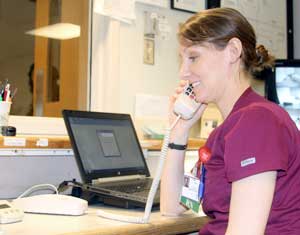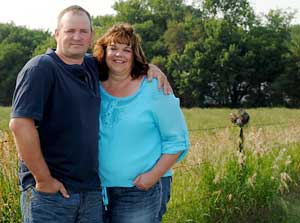May 15, 2014
Hotlines and Mental Health Screenings Provide Needed Support

Twenty years ago, Jay Giancola attended Family Day at Memorial Medical Center (MMC) in Ashland, Wisc., when someone close to him was struggling with addiction and he wanted to know what he could do to help. The class and his life experience led to his completing training to become an Alcohol and Other Drug Abuse counselor, a job he still holds at MMC. The free monthly Family Day and a 24-hour hotline staffed by psychiatric nurses are critical tools in helping identify behavioral health problems and getting people the help they need in a timely manner, according to Tom McMullin, Behavioral Health Director at MMC, a Critical Access Hospital (CAH).
Toll-free hotlines offer assistance for a wide range of mental health needs, populations and ages throughout the country. They may be state or nationally operated or relative to certain populations or regions. Some offer assistance for specific needs, such as suicide prevention, or specific age groups, such as teens and seniors. With increasing use of electronic technology, texting hotlines have also been implemented.
In addition to providing a listening ear and solid advice, MMC hotline nurses direct callers to community resources and arrange hospital admissions when necessary. Operators work closely with other community resources; for instance, referring callers for outpatient appointments with community human services organizations or medical clinics, or asking police to do an immediate home safety check in a crisis situation.
The Nebraska Rural Response Hotline, which receives about 4,000 calls each year, also offers callers follow-up services such as referrals for free stress counseling or even free legal advice. Interchurch Ministries of Nebraska, in cooperation with other farm-related organizations, initiated and continues to support the service. In operation since 1984, the hotline was put in place at a time when land values plummeted, and farm debt and foreclosures were at an all-time high in Nebraska.

“The need has never gone away,” said Hotline Responder Michelle Soll, who farms with her husband. “There continue to be good times and bad times for the agricultural industry and for individuals in Ag. A farmer might be doing great for years and then three years of drought can create financial and emotional stress that opens the door to mental health issues.”
Nebraska's hotline targets farm and ranch families and people employed in the agriculture industry across the state. MMC's hotline is specific to its service area, which McMullin describes as having “more trees than people.” MMC provides outpatient mental health and addiction programs, as well as the only mental health and hospital inpatient programs for a service area spanning nearly 4,000 square miles in northwest Wisconsin. Long, cold winters, poor transportation infrastructure and high poverty rates—particularly on the two Indian reservations—contribute to isolation and subsequent mental health issues. A recent community survey identified additional substance abuse services as the region's highest need. Depression, anxiety and substance abuse are the leading reasons for calls to both these hotlines. Anonymity is stressed to encourage participation. However, Soll and McMullin say their hotline callers often identify themselves and request services.
Screenings, such as National Depression Screening Day every October, are another means of identification and referral. Last year more than 85,000 people received free depression screenings at 3,000 participating sites. MMC is among those rural hospitals that have begun screening all patients at admission for alcohol and drug usage. MMC also provides mental health education and offers free screenings at community events such as the annual Senior Expo. Community resources such as Family Day are another means of identifying individuals in need.
“Alcoholism is a family disease and treatment needs to include the family,” said Giancola, who has facilitated MMC's Family Day for the last 14 years. “This really helps families look at their roles, the codependency that exists and how the family needs to heal too. It's a non-threatening means for families and family members who may think they have a problem to learn more without making a commitment.”
With fewer resources in rural communities, community-based partnerships are essential for mental health identification and treatment. McMullin said hospital behavioral health staff have planning sessions with other community providers, confer regularly with local social services agencies, attend weekly law court, and work with clinics and other health and community providers to identify individuals with mental health needs and connect them to appropriate services.
In addition to other available behavioral health care, hotlines and screenings offer easy access to troubled individuals hesitant to take that first step toward getting help.
Back to: Spring 2014 Issue
